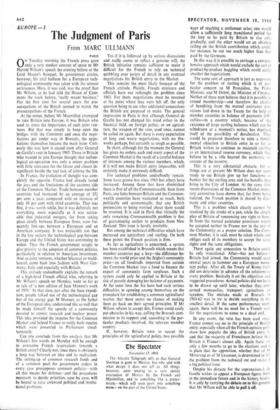But among the technical difficulties which have increased are agriculture
and sterling. On both these points the French position is firm.
As far as agriculture is concerned, a system has been established in Brussels which means that member countries pay a levy—the difference be- tween the world price and the (higher) community price—on all foodstuffs imported from outside the Common Market into a fund to finance the export of community farm surpluses. Such a system could only be applied to Britain at the risk of gravely damaging her balance of payments. At the same time the Six have had such serious difficulties in agreeing among themselves on the procedure for establishing a common agricultural market that there seems no chance of making them go back on their agreed principles. If Mr Wilson refuses to accept this, France could easily put obstacles in his way, calling the Brussels com- mission to its support and, according to the par- ticular products involved, the relevant member country.
If, however, Britain were to accept the priociples of the agricultural policy, two possible
'the %pectator
November 17. 1866
The Atlantic Telegraph tells us that General Sherman is gone to Mexico, but why and with what design it does not tell us. All things, however, seem tending to a very speedy evacuation of Mexico by the French and Maximilian, and to something like a protec- torate,—which will soon grow into something more,—on the part of the United States. the Community as a proper solution. The Com- mon Market, it is said, must be taken whole and obliges each of its members to accept the same rights and the same obligations.
There again any concession to Britain could be only transitional. After—but not before— Britain had joined, the Community would need several years to hammer out a European mone- tary policy. After all, the Treaty of Rome itse?f did not determine in advance all the solutions to every problem. Basically it set the objectives and suggested procedures. Actual policies did not have to be drawn up until later, whether they con- cerned monopolies, transport, agriculture or taxation. The mistake made at Brussels in 1961-62 was to try to decide everything in the smallest detail. If the same performance starts again, there will be no need for a French veto for the negotiations to come to a dead end.
In any event, the veto has been used once. France cannot say no to the principle of British entry, especially when all the French opinion polls show how popular the idea of British entry and that the majority of Frenchmen believe thr.t Britain is France's closest ally. Again there are only a few months to go to the elections and it is plain that the opposition, whether that of ii Mitterand or of M Lecanuet, is determined to lit: the problem from the technical rut and make it a big political issue.
Despite his distaste for the supranational. de Gaulle wishes to appear a European figure. both in the immediate future and in the history books. It is only by carrying the debate on to this ground that Mr Wilson will be able to pull it off.






























 Previous page
Previous page